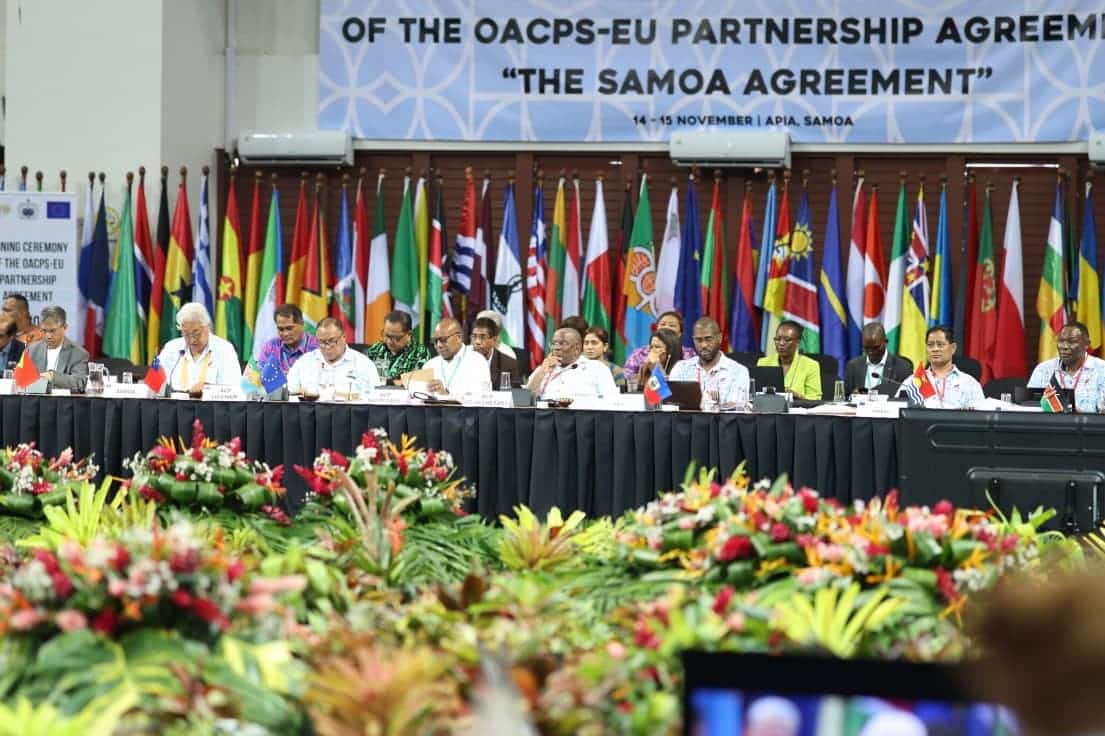Catholic bishops in Nigeria are calling for changes to an economic cooperation agreement between the EU and Africa, claiming it could force African nations to adopt policies on sexuality, abortion and gender contrary to the social, cultural and religious values of those nations.
“The agreement looks innocuous and attractive on the surface, but underneath it is carefully blended with post-modern secularistic ideologies that significantly undermine the moral, cultural, and religious beliefs of Nigerian citizens,” the country’s bishops said in a 12 July statement.
The so-called “Samoa Agreement” is a framework for cooperation among EU members and 79 Africa, Caribbean and Pacific nations, all together totalling a population of roughly two billion people.
It establishes six priority areas, including human rights, democracy and governance, peace and security, human and social development, inclusive, sustainable economic growth and development, environmental sustainability and climate change, as well as migration and mobility.
At the time it was rolled out in November 2023, EU negotiators hailed the agreement as a platform that would benefit everyone.
“It will provide a modernised framework to revitalise our relations with the largest grouping of partner countries to provide a platform for dialogue and coordination to face the challenges of our times together,” said Jutta Urpilainen, the EU’s Commissioner for International Partnerships and the chief negotiator.
“We will do everything to harness the collective power of our four regions,” Urpilainen said. “The EU and its member states – as Team Europe – have launched ambitious investment packages across all three regions, and we push forward to implement these packages,” she said.
Yet according to Nigeria’s Catholic bishops, the agreement contains other unheralded provisions which they say are troubling.
In a paper titled “Threats to the Sovereignty and Values of Nigeria in the Samoa Agreement”, issued 12 July, the Catholic Bishops Conference of Nigeria (CBCN) claimed that while the agreement offers appealing benefits, its language conceals hidden ideologies that not only contradict Nigeria’s values but also pose a threat to the nation’s sovereignty.
Describing themselves as “watchmen and guides, deeply committed to the sound moral, religious, and cultural growth of our dear country”, the bishops said Nigeria’s civil authorities might not be fully aware of the implications of the nuanced language in the document.
They complained that the agreement “gives international law status to sexual orientation and gender identity, comprehensive sexuality education, and abortion through its prolific reference to gender approaches and the phrase ‘sexual and reproductive health and rights’.”
The agreement, the clerics noted, contains 61 references to gender equality, gender perspectives and gender mainstreaming. Notably, Article 2.5 stipulates that parties to the agreement must consistently promote a gender perspective and ensure that gender equality is integrated into all policies.
Without a glossary of terms, the bishops said, signatories may interpret these concepts differently, potentially posing challenges during implementation.
They insisted that “gender” is no longer “an innocent term”.
“There are over 110 genders that would claim a stake in the term gender equality,” the bishops argued, and asserted that by signing the agreement, Nigeria will have to ensure that gender perspective is systematically mainstreamed across all policies and programs.
Nigeria will also have to foster gender-sensitive teaching and learning materials, as well as support universal access to Sexual and Reproductive Health and Rights (SRHR), they said.
“Universal access means access by all, including children. This has been the consistent aim of value-free sex education in schools. Comprehensive sexuality education has been about increasing demand for SRHR commodities among children and youth,” the bishops note.
They said such an agreement could lead to the erosion of Nigeria’s sovereignty.
Catholic activists under the umbrella organisation CitizenGO Africa have claimed the language in the document also seeks to promote gay relationships.
“The reference to ‘sexual and reproductive health and rights’ in these articles is particularly contentious, as it has been associated with promoting LGBT rights, sexual orientation, and gender identity, which are sensitive issues in Nigerian society,” they say in a 9 July petition calling on Nigeria to withdraw from the agreement.
The bishops are urging the Nigerian government to either seek amendments to the Samoa Agreement, or to withdraw from it altogether.
They have proposed a paragraph that they say should be incorporated into the agreement as an amendment.
“Nothing in this binding agreement can be interpreted to include any obligations regarding sexual orientation, gender identity, comprehensive sexuality education, abortion, contraception, legalisation of prostitution, same-sex marriage, or sexual ‘rights’ for children,” the proposed amendment reads.
They bishops argue that such an amendment would prevent SRHR from being covered by international law. They said if the EU turns down such an amendment, then Nigeria should withdraw from the Samoa Agreement.<br><br><strong>RELATED: <a href="https://catholicherald.co.uk/christian-democracy-in-europe-an-interview-with-catholic-historian-charles-coulombe/?swcfpc=1"><mark style="background-color:rgba(0, 0, 0, 0)" class="has-inline-color has-vivid-cyan-blue-color">Christian democracy in Europe: An interview with Catholic historian Charles Coulombe</mark></a></strong>
<em>(Photo courtesy the Organisation of African, Caribbean and Pacific States, via Crux.)</em>



